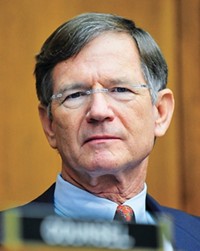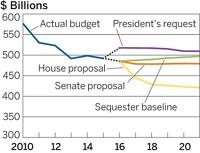Advertisement
Grab your lab coat. Let's get started
Welcome!
Welcome!
Create an account below to get 6 C&EN articles per month, receive newsletters and more - all free.
It seems this is your first time logging in online. Please enter the following information to continue.
As an ACS member you automatically get access to this site. All we need is few more details to create your reading experience.
Not you? Sign in with a different account.
Not you? Sign in with a different account.
ERROR 1
ERROR 1
ERROR 2
ERROR 2
ERROR 2
ERROR 2
ERROR 2
Password and Confirm password must match.
If you have an ACS member number, please enter it here so we can link this account to your membership. (optional)
ERROR 2
ACS values your privacy. By submitting your information, you are gaining access to C&EN and subscribing to our weekly newsletter. We use the information you provide to make your reading experience better, and we will never sell your data to third party members.
Environment
Reading The New Congress
Despite new committee heads, national problems will remain hard to resolve
by David J. Hanson
November 20, 2006
| A version of this story appeared in
Volume 84, Issue 47
The stunning rejection of Republican candidates in this month's election is certainly of historic proportions, but the change is not likely to mean anything significant for the science and technology community. Just because congressional committees will be chaired by Democrats doesn't mean that there will be any greater appreciation or understanding of science by our national leaders.
Most important, the federal budget is and always will be the biggest factor in determining government support for scientific research, starting new initiatives, improving education, and most other functions. And the budget is still a mess. With more than a $200 billion deficit for fiscal 2006, Congress continues to struggle with the funding for the 2007 fiscal year, which started in October, and the shift of power will only complicate finishing the budget.
This shift will be keenly felt, of course, by the George W. Bush Administration. For the past six years, with Republicans in power in the House of Representatives, Bush has been able to pretty much ignore the Democrats and push his agenda through the House with relative ease. With the loss of 28 Republican seats, however, that situation will be reversed, and few of Bush's priorities, such as tax cuts or drilling for oil in the Arctic National Wildlife Refuge, will have much chance of passing next year.
Up to now, Bush's record on funding science, technology, and engineering has been mixed. Although he supported the doubling of the budget at the National Institutes of Health early in his tenure, other programs did not fare so well. Environmentally related research, either at the Environmental Protection Agency or the Department of Energy, was regularly battered. Also cut each year was the basic and applied research budgets of the Department of Defense. Congressional appropriators almost always went along with the Bush R&D proposals, but in some instances, they increased science funding, such as for NIH in fiscal 2007, when Bush proposed no increase in funding at all.
The change of parties in Congress is not likely to reverse this situation. Congress seems to see research spending as a zero-sum problem. If it increases spending at one agency, such as NSF, then it is likely to cut funds at another spot, says the Department of Agriculture. Over time, the result has been steady but small overall growth in R&D spending, most of which has in fact been at DOD, which has seen some large increases in funding for development and testing of large weapons systems. Now, considering some of the tough budget talk from Democrats after the election, even those projects could be cut.
Funding levels for all federal programs are set primarily by the House Appropriations Committee, to be chaired next year by the irascible Rep. David Obey (D-Wis.). Obey actually chaired the committee for a short time before the Republicans took over in 1995. A staunch liberal, Obey can be expected to try to put a cap on federal spending next year, which would impact discretionary spending such as basic research.
Also returning to his old post will be Rep. John D. Dingell (D-Mich.), as chairman of the powerful House Energy & Commerce Committee. Dingell (who is the longest serving member of the House) ran the committee with an iron hand from 1981 to 1995 and had a reputation for tough federal oversight.
Another old-line liberal is expected to take over at the House Government Reform Committee, currently chaired by Rep. Tom Davis (R-Va.). Rep. Henry A. Waxman (D-Calif.) will take charge, and it is anticipated that he will hold hearings on the Food & Drug Administration's policies on food and drug safety and on ways the government can reduce drug prices in its health programs.
In other areas, the change will not have much of an impact. The House Science Committee, chaired now by retiring Rep. Sherwood L. Boehlert (R-N.Y.), has been a bipartisan-acting body, and it is expected to remain so under the anticipated new chairman, Bart Gordon (D-Tenn.). Unfortunately, the Science Committee is what is termed an authorizing committee, meaning it can pass legislation instructing agencies such as the National Science Foundation what to do, but it cannot provide the money. So, while this committee has been a big booster for increasing federal science support, it has had little impact on funding levels.
One of the biggest philosophical switches is expected to happen at the Senate Environment & Public Works Committee. Current Chairman Sen. James M. Inhofe (R-Okla.), who has consistently rejected the whole concept of climate change, will be replaced by Sen. Barbara Boxer (D-Calif.). Boxer, a partisan Democrat, has been one of the harshest critics of the Bush Administration's environmental policies, opposing attempts to change clean air regulations and sponsoring legislation to cut U.S. greenhouse gas emissions.
So soon after the election, the Democratic leadership has been talking a lot about inclusiveness and cooperation, but given the rancor that has built up between the two parties over the past several years, that is only talk. When it comes down to the tough negotiations on a controversial issue, such as expanding drilling for oil or widening stem cell research, the 110th Congress is going to have the same problems getting bills passed as the current one.
Views expressed on this page are those of the author and not necessarily those of ACS.




Join the conversation
Contact the reporter
Submit a Letter to the Editor for publication
Engage with us on Twitter